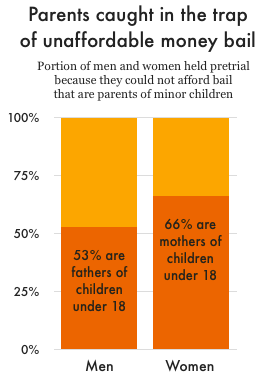How does unaffordable money bail affect families?
Using a national data set, we find that over half of the people held in jail pretrial because they can't afford bail are parents of minor children.
by Wendy Sawyer, August 15, 2018
Every day, 465,000 people are held in local jails even though they have not been convicted; legally, they are presumed innocent. Many are there because they cannot afford the money bail bond set for them. The harms of pretrial detention are well-known, both for defendants and for the juridictions that lock them up. But what about the harms of pretrial detention for families?
Previous research has estimated the number of incarcerated parents and the number of children who have parents behind bars. It’s a bit trickier, however, to estimate how many of these families are impacted specifically by pretrial detention or, even more specifically, by unaffordable money bail. We set about to answer this question.

We analyzed the most recent Survey of Inmates in Local Jails to find that over half of the people in jail who could not make bail were parents of children under 18. Of the women who could not meet bail conditions, two-thirds were mothers of minor children, while just over half of the men were fathers. (See a table with all of our findings below.) Although this survey was last conducted in 2002, it remains the most recent national data on the subject available.
These results are generally consistent with national estimates of parents in the prison population. The Bureau of Justice Statistics (BJS) reports that 52% of people in state prison and 63% of those in federal prison were parents of minor children in 2007, although the share of mothers among women in pretrial detention is slightly greater than among women in prison.
Two smaller but more recent studies suggest that the impact of pretrial detention on families may be even greater than the two national BJS surveys indicate. Because of their small sample sizes, these studies are not generalizable, but they offer a glimpse of the how changes in jail populations may have impacted families since 2002, when the national data was last collected. In particular, since 2000, pretrial detention has increased by 31% to make up about two-thirds of the overall jail population, while the number of convicted people held in jail has actually fallen. Over the same 16 years, the jail incarceration rate for women has risen 26% while the rate for men has fallen by 5% — a significant trend when we consider that women are more often the primary caregivers of children.
First, in a 2016 study, researchers from George Mason University surveyed pretrial defendants, including both defendants who were detained because they did not post money bond and those who were released to pretrial supervision. Their analysis found that 56% of the detained defendants were parents. Alarmingly, 40.5% of those in this study said that pretrial detention would change — or already had changed — the living situation for a child in their custody. An additional 16.5% didn’t know whether it would change their child’s living situation.
The Robina Institute recently published the results of a 2017 study of parents in Minnesota jails and their children, finding an even greater proportion of jailed parents. Although the study did not distinguish between the pretrial and sentenced populations, it found that 69% of adults in local jails were parents of minor children. This study adds an additional detail missing in most others: 6% of the mothers reported being pregnant, and 9% of the fathers reported having a pregnant partner.
One missing, but essential data point is the number of children separated from a parent because of unaffordable bail. Our analysis of the 2002 survey data shows that at the time of the survey, over 150,000 children had a parent in jail because they couldn’t afford their bail bond. That means more children than adults were impacted by unaffordable money bail. Because of the significant changes in the jail population since 2002, we won’t attempt to extrapolate what the number of impacted children might be today. But as pretrial detention has grown, the number of children harmed by parental incarceration because of the money bail system has almost certainly grown, too.
Summary of findings from the 2002 Survey of Inmates in Local Jails
| Estimated number with bond set that could not afford bond | People with no children under 18 (percent) | Parents of children under 18 (percent) | Lived with children before incarceration (percent of parents) | Estimated number of minor children | |
|---|---|---|---|---|---|
| Men | 115,000 | 47% | 53% | 39% | 131,000 |
| Women | 13,000 | 34% | 66% | 50% | 20,000 |
| Total | 128,000 | 46% | 54% | 40% | 151,000 |
Special thanks to Board member Dan Kopf for his help with the data.



